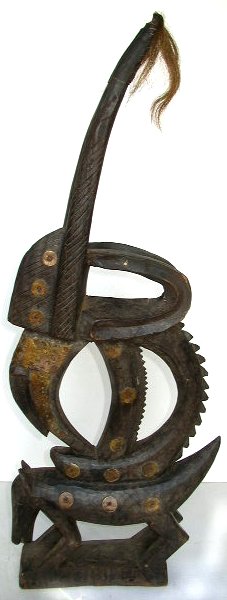

 Marka (Warka), Mali
Marka (Warka), Mali

 Marka (Warka), Mali
Marka (Warka), Mali
Male tji wara (antelope
headdress). The Marka are
a Mande subgroup. This ethnic group is independent from the Bambara but their
styles show a strong Bambara influence.
They live in the region that extends from the north of the Bambara to the
Senegalese border. The dry savanna permits
no more than a subsistence economy, and the soil produces, with some difficulty, millet,
rice, and beans. Among the best known of their associations is the tji wara.
Tji means “work”, and wara
means “animal”, thus the word means “working animal.” When these
headdresses were worn at agricultural festivities before the rainy season and when the
fields were cleared, they did “work” in the mind of the Marka, since they were
supposed to increase the fertility of the earth and increase yields. This very unusual tji
wara presents the antelope by the horns and includes the image of a horse. In the past the purpose
of this association was to encourage cooperation among all members of the community to
ensure a successful crop. In recent time, however, the concept of tji wara has become associated
with the notion of good farmer, and the tji wara masqueraders are
regarded as a farming beast. Always performing together in a male and female pair, the
coupling of the antelope masqueraders speaks of fertility and agricultural abundance. According to one
interpretation, the male antelope represents the sun and the female the earth. In this tji
wara headdress human and antelope
features are combined.
Material: wood, metal sheeting, cotton
tassels
Size:
H. 28½”, W. 2½”, D.